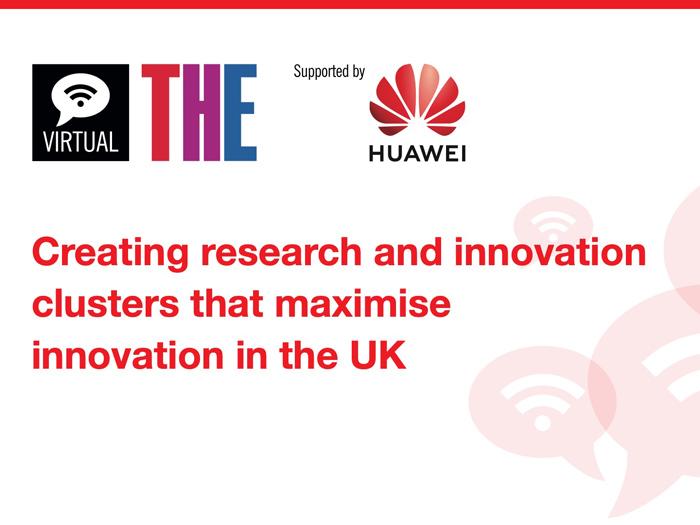
How ÖĐąúAƬ can harness and empower the UK’s research and innovation clusters
Partnerships with industry, local government, national bodies, and international groups are needed, as well as collaboration between institutions, according to experts


Huawei
Find out how Huawei is supporting the future of intelligent, digital education
As scientific research becomes more international and competitive than ever, the UK must redouble its efforts to scale and protect its world-leading research. At a roundtable discussion organised by Times ÖĐąúAƬ and Huawei, experts from the academic sector came together to discuss how its research and innovation clusters in the UK can continue to maximise innovation, a topic at the centre of a new report by THE and Huawei, Global Britain: A Science Superpower for A New Era.
“Universities play a key role in driving social and economic impact,” Chris Baker, a manager of knowledge exchange and economic development at Sheffield Hallam University, explained. “Innovation leads the way, of course, but in order to ensure it has impact, you need to have a robust talent pipeline. To achieve this, benchmarks are key – and not just financial metrics. Softer measures of success, like improving individuals' life chances or mental well-being, should also be considered.”
“I think granularity is an important factor, too,” David Robertson, a professor at the University of Edinburgh, added. “As well as smaller metrics, you need to measure larger changes in the city where an institution is based.”
The scale of change taking place in many parts of the UK can make it especially difficult to measure the impact delivered by institutions. “One of the things we did a few years ago was benchmark Oxfordshire’s bioscience performance against regions in partner countries,” Helen Lawton Smith, a professor of entrepreneurship at Birkbeck, University of London, said. “We produced a series of metrics to better understand the specialisation of each region.”
Sarah Lethbridge, pro dean of external engagement at Cardiff Business School, Cardiff University, also pointed to the ÖĐąúAƬ Business and Community Interaction Survey (HE-BCI) as a way of measuring how well universities engage wider society. “Internal metrics are extremely useful too,” Lethbridge noted. “We’ve been looking more closely at how responsive we are as a university to the needs of industry.”
In the development of innovation clusters, the role of local, national and international partners is key. “If you’re a university with a broad course offering and want to maintain a strong academic presence, it’s essential that the majority of the research you do is open, even when it is conducted in partnership with industry,” Robertson continued. “Institutions also need public justification. Research needs to be transparent, auditable and accountable.”
“Our best industrial engagement has been where companies have taken the time to understand the different sets of expertise at the university,” Lethbridge said. “Where partnerships are much more transactional, they often don’t work as well.”
It’s also important that the development of research clusters doesn’t descend into myopia. “Universities are multi-actor organisations,” Lawton Smith explained. “For example, when we look at Cambridge, we shouldn’t just look at the University of Cambridge but other institutions in the whole of East Anglia. Research is also international, with insights emerging from work being conducted in other countries. This also needs to be recognised within innovation clusters. Not only are industries operating on a global scale, but so too are academics.”
“Here at Sheffield Hallam, we are talking a lot about porosity,” Baker said. “We want to explore mechanisms that enable the movement of academics and industry stakeholders in and out of the university. Conversations make innovation happen.”
Driving those conversations depends on creating an environment where collaboration is fostered between institutions, rather than competition. Facilitating this depends on involvement and funding from local government bodies, national institutions and international groups.
The panel:
- David Robertson, professor, University of Edinburgh
- Sarah Lethbridge, pro dean of external engagement, Cardiff Business School, Cardiff University
- Helen Lawton Smith, professor of entrepreneurship, Birkbeck, University of London
- Chris Baker, knowledge exchange and economic development, Sheffield Hallam University
- Sam Whittaker, ÖĐąúAƬ consultant, Times ÖĐąúAƬ (chair)
about Huawei and ÖĐąúAƬ.
